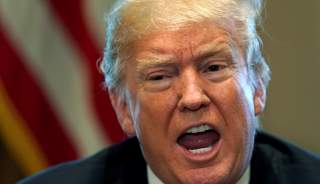What Will Trump's Tariffs Mean for America's Economy?
It's not clear that President Trump understands the consequences of acting on trade disputes unilaterally.
The Cost of Protectionism
In the end, protectionism in the form of tariffs today are ineffective for several reasons. In the current steel case, for one, China is nowhere close to being the top steel exporter to the United States. Of the total, China represents only 2.9 percent. And, having gone through this in the past, China has already largely insulated itself from any punitive U.S. trade actions. For another, the Economist indicates that a document produced in August by President Trump’s Council of Economic Advisors suggested that “the surge of steel imports in the first half of 2017 was consistent with changing domestic demand, not dumping by foreigners.”
In addition, many companies engaged in international trade are part of the larger mosaic that form the global supply chain today. Dartmouth Professor Irwin argues that nearly “half of all U.S. imports consist of intermediate goods, such as factory equipment, parts and components, and raw materials.” These intermediate goods are then used as part of the production process or sold as outputs to other companies around the world, who use them as inputs.
Indeed, this segues to the point that even when foreign companies are slapped with tariffs, they can simply move production to another country, or even the United States. Witness the Chinese company Qingdao Haier Company and its $5.6 billion purchase of General Electric’s home appliance business. If the Trump White House follows through with the president’s tariff on washing machines, the company would be well placed to increase production at its facilities in Louisville, Kentucky, thereby skirting the tariff. “Tariffs really don’t work” argues Barry Zekelman, chief executive of Illinois-based steel pipe manufacturer Zekelman Industries, “if you apply a tariff they can still move that good through another country,” Worth noting is the fact that some of these companies also employ Americans.
Aluminum, like steel tariffs, would suffer the same consequences. While the United States imports 90 percent of the aluminum that it uses for various products, China’s share of the exports amount to only 6 percent. And the percentage of aluminum smelting jobs to be saved amount to 3 percent of the total jobs in the aluminum industry. The other 97 percent (about 156,000) exist in downstream industries that use aluminum in manufacturing. Defense industry manufacturers will not be impacted much by the tariffs since their reliance on imported aluminum and steel are minimal, according to the Tax Foundation. However, prices for everything else from auto parts to beer cans to Hershey’s Kisses foil wrappers can be expected to rise.
The Founding Advice from Hamilton
The polemics of tariffs is as old as the founding of the Republic. In his Aftermath of Hamilton’s Report on Manufactures, Professor Irwin, explained that “Although [Alexander] Hamilton’s proposals for bounties (subsidies) failed to receive support, virtually every tariff recommendation was adopted by Congress in early 1792.” The tariffs avoided the appearance of protectionism because President George Washington’s Secretary of the Treasury Hamilton did not want to discourage imports, which were the critical tax base for funding the public debt.
Furthermore, Irwin noted that “although Hamilton’s moderate tariff policies found support among merchants and traders, the backbone of the Federalist Party, disappointed domestic manufacturers soon came to embrace the much more draconian trade policies of the Republican Party led by Thomas Jefferson and James Madison,” and “protectionist interests shifted their political support from the Federalists to the Jeffersonian Republicans during the 1790s.”
When contemplating tariffs in a world of growing nationalist sentiment, policymakers—both Republicans and Democrats—should resist the temptation to reflexing of to tariffs. Professor Irwin warns that when Congress passed the Smoot-Hawley Tariff Act in 1930, a League of Nations report suggested that the Act could be “the signal for an outburst of tariff-making activity in other countries, partly at least by way of reprisals.”
Retreating from the Rule-based Global System
President Trump’s tendency to act unilaterally reflects his desire to skirt the WTO altogether. According to the Bloomberg editorial board, the president had already “threatened to withdraw from it on the campaign trail and has made clear that he may not consider its rulings binding.” President Trump’s tariffs outside of the WTO framework will almost certainly result in retaliation.
Given the gravity of its implications, it is not entirely clear that President Trump completely understands or appreciates the consequences of acting on trade disputes unilaterally rather than moving them through the WTO. This is an existential threat to a system that the United States has tirelessly promoted since World War II. This global system “constrains the policies of the 163 other WTO members with which the United States trades.”
Former U.S. Trade Representative Michael Froman has warned that “it will just lead other countries to retaliate against us or, perhaps even worse, imitate us, and take action on their own without regard to international obligations,” and cause the entire world trade system to unravel and, in the process, doing irreparable harm to the global economy and the American credibility.
In the end, the objective lesson here might be summed up in a proverb attributed to the Chinese sage Confucius: Before you embark on a journey of revenge, dig two graves.
Patrick Mendis, is a former American diplomat and the author of Commercial Providence, Trade for Peace and Peaceful War, and a previous Rajawali senior fellow of the Harvard Kennedy School of Government who is currently an associate-in-research at the Fairbank Center for Chinese Studies at Harvard University. Joey Wang is a defense analyst. Both are alumni of the Harvard Kennedy School of Government.
Image: Reuters
Recommended:
Why North Korea's Air Force is Total Junk

